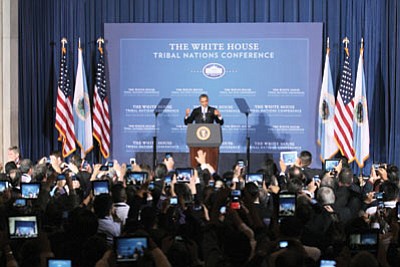Obama pledges action at conference of tribal leaders
President encourages federal officials and tribal leaders to do everything they can to get Indian Country in the best shape possible
WASHINGTON - President Barack Obama told tribal leaders from across the nation Dec. 5 that while gains have been made in Indian Country in his first four years in office, more work needs to be done.
"We focused on justice and tribal sovereignty," Obama said. "Long-standing legal disputes like the Cobell case have been resolved. I signed into law the Tribal Law and Order Act, which is helping fight crime.
"These are all important steps. But we've got more to do," he told leaders of the 566 federally recognized tribes invited to the fourth annual White House Tribal Nations Conference.
The remarks capped a day in which eight of Obama's Cabinet members also addressed the summit and the White House released a report citing its accomplishments in increasing tribal consultation and collaboration.
The administration's attempts at improving the nation-to-nation relationships between tribes and the federal government are working, said John R. Lewis, executive director of the Inter Tribal Council of Arizona Inc.
"There's been good progress," said Lewis, who praised the administration for reaching out to tribes across the country. He added that federal officials, both native and non-native, in various departments have been working to make communications easier.
"It's a really good policy to work together," Lewis said.
Among the remaining goals identified Wednesday was a "clean Carcieri fix," which supporters say would clarify a Supreme Court ruling that created two classes of recognition for tribes. Many tribal leaders and other officials fear the ruling could affect tribal land ownership matters.
Lewis said the administration's position on Carcieri recognizes the desire of tribes.
"They (tribes) want to be clear on the equal status of all tribal nations," he said.
Also discussed last week was the just-closed $3.4 billion Cobell settlement, the government's response to a lawsuit that alleged decades of federal mismanagement of tribal trust lands. The settlement was repeatedly mentioned as one of the most significant triumphs in the attempt to improve the relationship between the federal government and Indian Country.
The settlement became final in November after the deadline for legal appeals passed. Payments could start reaching class members as early as this month, ending 17 years of court wrangling.
But other issues remain: persistent poverty, high rates of unemployment and a disproportionate level of domestic abuse.
During topical breakout sessions with senior officials, tribal leaders gave suggestions on what they would like to see oficials address and offered solutions on everything from the loss of wildlife and natural resources to how to lower high school dropout rates.
It is a "moral imperative" to do better in Indian Country, and the gains of the last four years, such as those cited by the president, are just the beginning, said Interior Secretary Ken Salazar.
Salazar, who served as host of the event at the Interior Department, said that resolving "long-standing water disputes" is another goal. Obama has signed six water-rights agreements, including one involving the Navajo in New Mexico and one involving the White Mountain Apache tribe of Arizona.
"We are very proud of that work and recognize that we still have a lot more to do around the country," Salazar said.
One of those remaining projects is the proposed settlement of Little Colorado River water-rights claims by the Hopi and Navajo tribes. A bill sponsored by Arizona Sens. Jon Kyl and John McCain stalled this summer in the face of opposition from tribal members, and efforts in recent weeks to revive the deal appear to have stalled again.
During his statement Wednesday, Obama said that federal officials and tribal leaders should do everything they can to get Indian Country in the best shape possible for future generations of Native Americans.
"We're going to keep working together to make sure that the promise of America is fully realized for every Native American,"
SUBMIT FEEDBACK
Click Below to:




